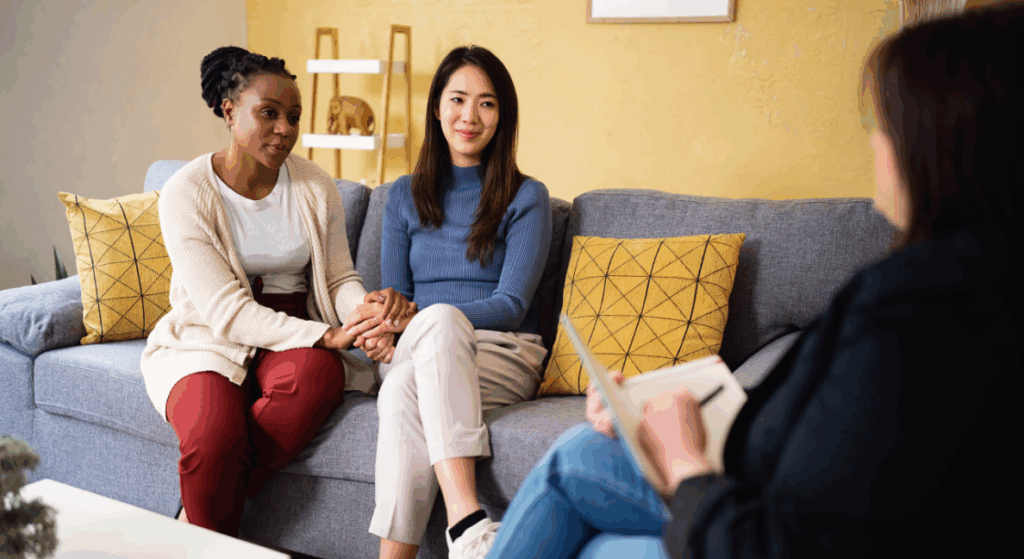
Strengthen Your Relationship with Telehealth in New Jersey
Healing at Home: How Telehealth Deepens Couple Connections
At Maplewood Counseling, we provide inclusive care for people of all races, cultures, and backgrounds, including interfaith, interracial, BIPOC, LGBTQIA+, and blended families. Our therapists bring lived experiences and specialized training to create a safe, affirming space for all.

Even in loving relationships, life’s pressures can pull you and your partner in different directions. When stress, distance, or hectic schedules make it hard to prioritize your relationship, it’s easy to feel disconnected—but support is closer than you may think. The comfort of home, paired with the guidance of a skilled counselor, can create new pathways for compassion, healing, and deeper connection.
The Emotional Advantages of Telehealth for Couples
Choosing virtual sessions isn’t just about convenience—it’s about nurturing genuine emotional safety. When you can sit together on your own couch, you’re in a space that already holds your shared moments and vulnerabilities. This familiar environment empowers many couples to express themselves more openly, address sensitive topics, and take courageous steps toward healing.
Vulnerability Where You Live and Love
Being at home lowers our guard. This comfort can unlock deeper honesty and empathy as partners practice difficult conversations in real time—in the very rooms where everyday challenges arise. For many couples, this transforms therapy from a theoretical exercise into meaningful, lived experience that shifts the dynamic at home.
Turning Home Into a Safe Haven
Telehealth helps redefine the home as not only a source of routine and responsibility, but also a place where rebuilding trust and closeness becomes possible. Arguments that once felt overwhelming in the kitchen or bedroom can, over time, give way to moments of understanding and reconnection—right where they matter most.
Making Emotional Growth a Priority—Together
True change happens when you engage with each other consistently. Virtual therapy allows you to prioritize these moments of connection without the barriers of travel or upended routines. Carving out this intentional space reinforces that your relationship deserves care, even amidst life’s uncertainty.
Rest After Session, Not Rush
The journey doesn’t end when your session does. Being able to reflect together—without the distraction of a car ride or commute—lets you and your partner absorb insights, offer support, or simply sit in the comfort of shared progress. This time often helps couples reinforce the sense of safety and closeness that therapy can spark.
Sustaining Connection Through Life’s Ups and Downs
Relationship challenges look different for everyone—maybe you’re struggling to feel truly heard, navigating the aftermath of a disagreement, or longing to rebuild intimacy. What unites couples in telehealth is a shared commitment to grow together, even when it isn’t easy. Virtual sessions offer a consistent reminder that you can reach for help whenever you need it, weaving connection into the rhythm of daily life.
Helpful Telehealth Resources
Explore these supportive options to take the next gentle step forward:
- Learn more about how telehealth works and answers to common questions in our Telehealth FAQ.
- Discover the logistics and benefits of telehealth therapy in New Jersey in our comprehensive guide.
Ready to start your journey toward a healthier partnership?
Book Your Virtual Session and let us help you strengthen your relationship.
Frequently Asked Questions About Telehealth for Couples
How long is a typical telehealth session for couples?
Most virtual couples sessions last about 50 minutes, giving you and your partner time to be heard, understand each other, and make meaningful progress together.
Is privacy protected during telehealth therapy?
Absolutely. Sessions are conducted on secure, confidential platforms to safeguard your conversations. Your therapist is committed to providing a safe space where both partners can speak openly.
What technology do we need for telehealth sessions?
All you need is a device with internet access, such as a computer, tablet, or smartphone. A quiet, private space and a reliable connection help ensure your sessions are comfortable and uninterrupted.
Can both partners join from different locations?
Yes, telehealth allows flexibility. Each partner can join the session from separate places if needed, making it easier to fit therapy into busy schedules.
What if we’re new to virtual therapy?
It’s natural to feel unsure at first. Your therapist will guide you through the process and answer any questions, making sure you feel supported every step of the way.
If you have questions, reach out anytime. We’re honored to help you build a stronger, more fulfilling relationship—together.









